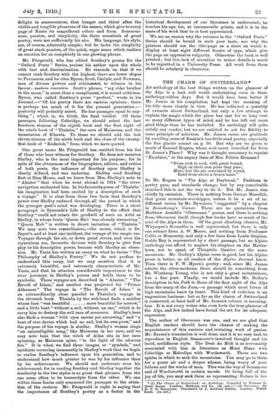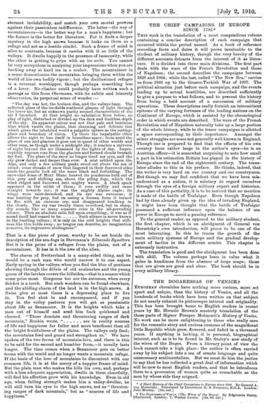THE CHARM OF SWITZERLAND.*
AN anthology of the best things written on the glamour of the Alps is a task well worth undertaking even in these anthology-ridden days. But it would have been better if Mr. James in his compilation had kept the meaning of his title more closely in view. He has collected a quantity of extracts about Switzerland, but only a few attempt to explain the magic which the place has cast for so long over so many different types of mind, and he has left out more good things than he has included. No anthology will quite satisfy any reader, but we are entitled to ask for fidelity to some principle of selection. Mr. James earns our gratitude by recalling some of Ruskin's too-little-read poetry, especially the fine glacier sonnet on p. 50. But why are we given sc much of Samuel Rogers, whose soul never travelled far from St. James's Place P Why was it thought necessary to reprint " Excelsior," or the sugary lines of Mrs. Felicia Haulms ?
"From rock to rock, with giant bound, High on their iron poles they pass ; Mute, lest the air, convulsed by sound, Bend from above a frozen mass."
So Mr. Rogers in "The Alps at Daybreak." Fashions in poetry pass, and standards change, but by any conceivable standard this is not the way to do it. But Mr. James sins chiefly by omission. There is nothing from George Meredith, that great mountain-worshipper, unless it be a set of in- different verses by Mr. Bywaters, " suggested " by a chapter in Beauchamp's Career. There are no quotations from Matthew Arnold's " Obermann "poems, and there is nothing from Obermann itself, though few books have so much of the soul of the Alps in them. Of the great climbing classics, Mr. Whymper's Scrambles is well represented, but there is only one extract from A. W. Moore, and nothing from Professor Collie or Mummery, and only a few lines from Leslie Stephen. Guido Rey is represented by a short passage, but no Alpine anthology can afford to neglect his chapters on .the Matter- horn, not to speak of Theophile Gautier on the same mountain. Mr. Godley's Alpine verse is good, but his Alpine prose is better, as all readers of the Alpine Journal know. Then there is F. W. Myers's poetry ; and, since Mr. James admits the ultra-moderns, there should be something from Mr. Winthrop Young, who is not only a great mountaineer, but a fine poet. Finally, we would include Mr. Belloc's description in his Path to Rome of the first sight of the Alps from the scarp of the Jura,--a .passage which most lovers of high mountains know by heart. This kind of criticism is an ungracious business ; but so far as the charm of Switzerland is concerned, at least half of Mr. James's volume is-meaning- less. It is not every writer who even feels the true glamour of the Alps, and few indeed have found the art for its adequate
. . expression.
The author of Obermann was one, and we are glad that English readers should have the chance of making the acquaintance of this curious and irritating work of genius. Mr. Barnes's translation is well done, and it is no easy task to reproduce in English Senancour's involved thought and his lucid, mellifluous style. The Dent du Midi is as irrevocably associated with him in literature as Mont Blanc with Coleridge or Helvellyn with Wordsworth. There are two spirits in which to seek the mountains. You may go to them for a purer air and a deeper silence, being weary of your fellows and the works of man. This was the way of Senancour and of Wordsworth in certain moods. Or being full of the joy of life, you may seek them as representing Nature in her
• (1) Ths Charm of Stoitteriand: an Anthology. Compiled by Norman G. Brett James. London: Methuen and Co. [Ss. net.]—(2) Obermann. By B. P. de Senancour. Translated by Y. Anthony Barnes. London: Walter Scott. [is. net.]
sternest inviolability, and match your own mortal prowess against their passionless indifference. The latter—the way of mountaineers—is the better way for a man's happiness ; but the former is the better for literature. For it finds a deeper mystery in the high snows because it looks on them as a
refuge and not as a hostile citadel. Such a frame of mind is alive to contrasts, because it carries with it so little of the valleys. It dwells happily in the presence of immensity, while the other is getting to grips with an ice arete. You cannot be very scrupulous in analysing your impressions when you are hacking away at hard ice in a couloir. The mountaineer in
a sense domesticates the mountains, bringing them within the world of his own bodily vigour ; but the disillusioned refugee is a reverent worshipper, though perhaps something less
of n lover. No climber could probably have written such a passage as this from Obermann, with its subtle and leisurely observation, its perpetual sense of wonder :— " The day was hot, the horizon dim, and the valleys hazy. The reflected glass of the ice-fields scattered gleams of light through the lower air, but an unknown purity seemed characteristic of the air I breathed. At that height no exhalation from below, no play of light, disturbed or divided up the dark and limitless depth of the sky. Its apparent colour was not that pale and luminous blue which vaults the plains, that charming and delicate tint which gives the inhabited world a palpable sphere as the resting- place and boundary of vision. Up there the impalpable ether allows the sight to lose itself in boundless space ; from amid the glare of sun and glaciers it goes out in quest of other worlds and other suns, as though under a midnight sky ; it reaches a universe of night beyond the air illumined by the lights of day. Imper- ceptibly vapours rose from the glaciers and formed clouds beneath my feet. The glare of the snow no longer tired my eyes, and the sky grew darker and deeper than ever. A mist settled upon the Alps, and only a few solitary peaks stood out above the sea of cloud ; some streaks of snow that lingered in their furrowed sides made the granite look all the more black and forbidding. The snow-clad dome of Mont Blanc heaved its ponderous bulk out of this grey and shifting sea, above the piling fogs, which the wind ridged and furrowed into mighty waves. A black speck appeared in the midst of them ; it rose swiftly and came straight towards me ; it was the mighty Alpine eagle ; its wings were mist-drenched, and its eye was ravenous ; ib was hunting for prey, but on seeing a human form it turned to flee with an ominous cry, and disappeared headlong in the clouds. The cry was twenty times re-echoed, but in sharp, dry sounds, like so many separate cries in the all-pervading silence. Then an absolute calm fell upon everything ; it was as if
sound itself had ceased to be Such silence is never known in the bustling valleys ; it is only on the cold heights that still- ness like this holds sway ; no tongue can describe, no imagination conceive, its impressive abidingness."
That is a fine piece of prose, worthy to be set beside the
description of the sea-fogs in Stevenson's Silverado Squatters. But it' is the prose of a refugee from the plains, not of a mountaineer. It has in it the awe of the alien.
The charm of Switzerland is a many-sided thing, and he would be a rash man who would narrow it to one aspect. Early spring in the valleys, when you find the blue of gentians showing through the debris of old avalanches and the young green of the larches covers the hillsides,—that is a season which some prize most. Gorgeous too are the autumns, when every thicket is a torch. But such wonders can be found elsewhere, and the abiding charm of the land is in the high snows. A Swiss glen at most times is a depressing place to live in. You feel shut in and encompassed, and if you
stay in the valley pastures you will get as pessimistic about life as Senanconr. It is the heights which take a man out of himself and send him back quickened and
cheered. "Those desolate and threatening ranges of dark mountain," Ruskin wrote, " are in reality sources of life and happiness far fuller and more beneficent than all the bright fruitfulness of the plains. The valleys only feed ; the mountains feed and guard and strengthen us." We have spoken of the two forms of mountain-love, and there is this to'be said for the second and humbler form,—it usually lasts longer. The time comes when a Senancour gets on better terms with the world and no longer wants a mountain refuge. If the basis of the love of mountains be discontent with our common life, it is at the mercy of a happier frame of mind. But the plain man who makes the hills his own, and, perhaps with a less adequate appreciation, dwells in them cheerfully, will find his affection grow with his knowledge. Even in old age, when failing strength makes him a valley-dweller, he will still turn his eyes to the high snows, not as " threaten- ing ranges of dark mountain," but as " sources of life and happiness."



















































 Previous page
Previous page